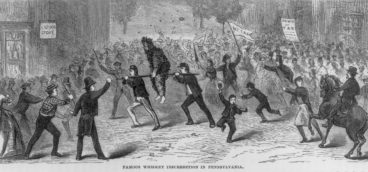
Touring with the Big Shots
The typical family unit on my tour was a mom, a dad, and a 17-year-old kid who was a prospective student. But one day an unusual unit showed up – a kid and his gorgeous older sister. Well, well, well, I thought. Previously in this series: How Not to be a College Guide The third …

How Not to Be the College Guide
As a scholarship boy I was expected to get a summer job, save lots of money, and apply it to my tuition for the fall semester. Except nobody was hiring. It was now late in my sophomore year and I scurried over to the Financial Aid office to let them know my summer job prospects …

And the Winner is…Us (The U.S.)
“There seems to be no sign of intelligent life anywhere.” — Buzz Lightyear Last week we looked at countries that are likely to suffer the most as America abandons its role as world cop. This week let’s take a look at countries which are likely to fare best. Previously in this series: China’s Future ProblemsBut remember …

China’s Future Problems
“This is an intergalactic emergency!” Buzz Lightyear I could devote several months of essays to the question of how and why America became so divided and how and why we lost the stomach for maintaining the global paradise we so painfully created and maintained for so long. But what’s the use? It is what it is. …

Goodbye to All That
“Because of YOU, the future of this entire universe is in jeopardy!”- Buzz Lightyear The period after World War II was essentially a human paradise. It wasn’t perfect, of course, but compared to any other period in human history it was as close to paradise as mortal humans could ever have expected to experience. Naturally, it …

To Greatness – and Beyond!
“To infinity – and beyond!” – Buzz Lightyear With thanks to Buzz Lightyear, let’s take a look, first, at the astonishing world America created after World War II, and then we’ll watch as that world crumbles and re-forms into the dystopian future we are hurtling toward. Late last year I wrote a series of essays in …

The Surprising (Sad) Ending
I sometimes write about investment matters or geopolitical issues, but mostly these essays are pieces of fluff designed to entertain or, I hope, amuse my readers. But this series will end on a sad – even a tragic – note. Previously in this series: Favorite Drinks & Pittsburgh LoreThe Rainbow Room I started my company, …

Favorite Drinks & Pittsburgh Lore
Hot buttered rum Since temperatures are plunging as I write this series, I cheerfully pass on to you The Oxford Companion to Spirits and Cocktails (TOCSC) recipe for hot buttered rum: mix one cup of softened, salted butter, 1 teaspoon cinnamon, ½ teaspoon nutmeg. This will keep in the refrigerator for a long time. When your fingers are …

Tales from the Bunghole (Not What You May Think)
“In wine there is wisdom, in beer there is freedom, in water there is bacteria.” — Benjamin Franklin, supposedly. Except the first recorded use of the word “bacteria” occurred in 1864 and Franklin died in 1790. Previously in this series: Odd but Essential Booze TruthsSingle barrel and small batch Every barrel of whiskey is slightly different …
Tales from the Bunghole (Not What You May Think) Read More »

Odd but Essential Booze Truths
I had so much fun reading The Oxford Companion to Spirits and Cocktails (TOCSC) that I could continue writing about it for months. But don’t worry, I won’t. Previously in this series: Tennessee Whiskey and the Whiskey RebellionThe book isn’t a work of fiction or nonfiction, of course, but a work of reference. In fact, in 2022 it won …

Tennessee Whiskey and the Whiskey Rebellion
Back in 1981 two songwriters, Dean Dillon and Linda Hargrove, were sitting in the Bluebird Café in Nashville drinking a lot of Tennessee whiskey. Dillon told Hargrove he had an idea for a song about the whiskey and so, at four a.m., they headed off to Hargrove’s place and wrote “Tennessee Whiskey,” a terrific song. …

Rise of the Fern Bar!
When I first reached legal drinking age most bars were designed to be patronized by men – that is, by people who couldn’t care less what the places looked like. As a result, most bars looked and smelled terrible. (But I quickly got used to it.) Previously in this series: The Mysteries of VodkaBut along …

The Mysteries of Vodka
Vodka “Vodka is unlike other forms of alcohol in that there is no justifiable excuse for drinking it … you might as well inject vodka into your bloodstream.” Russian writer Viktor Yerofeyev Previously in this series: The Near Classic CocktailsFor much of my drinking life I assumed that vodka-was-vodka, a neutral grain spirit that tasted …

The Near Classic Cocktails
The CosmopolitanI’m going to be flat-out sexist because it’s true – the Cosmo was a promising new cocktail that was ruined when, in the 1990s, virtually every young woman who ever went near a bar ordered one. No doubt they heard about it from Sex and the City, where, surprise surprise, it was the house drink. …

Classic Cocktails
The Manhattan This mixture of whiskey, sweet vermouth and bitters, garnished with a maraschino cherry, is believed to be the original “cocktail” in the modern sense of the word. Invented around 1880, the Manhattan became almost instantly popular, with the Boston Herald calling it “as good as anything that can be manufactured.” Previously in this series: Shaken …

Shaken not Stirred? Tisk Tisk
The martini (continued) Global consternation erupted when, in Dr. No, James Bond ordered a Smirnoff vodka martini. He then compounded this felony by instructing that it be “shaken, not stirred.” Previously in this series: How Does a Cocktail Achieve “Classic” Status?Here is the original text of this unfortunate incident: [In the prior scene Bond ultimately wins …

How Does a Cocktail Achieve “Classic” Status?
The Daiquiri The Daiquiri is one of those terrific drinks that happened by accident. Around the turn of the twentieth century an American engineer named Cox, working in the small town of Daiquiri in Puerto Rico, was entertaining some American visitors. He was about to whip up some drinks but realized he was out of …

Speaking of Drinks…
Tiki two As I mentioned, I came of legal drinking age at a time when you could only get tiki drinks at Chinese restaurants. The pioneering Don The Beachcomber was no more, and as far as I knew all the Trader Vic’s had closed, except for a few locations abroad. Previously in this series: The …

The Tiki Phenomenon
I had the great misfortune to reach legal drinking age just as the tiki drink phenomenon was turning into a parody of itself. Formerly terrific drinks such as the Zombie, the Scorpion and the Rum Runner were now available only in Chinese restaurants and they all tasted exactly alike, being made by then out of …

Strange but True Tales from the Bottle
TOCSC pays for itself I had barely dipped my toe into The Oxford Companion to Spirits and Cocktails (TOCSC) when the book paid for itself – which is saying something – because I found the guy I want to be in my next life. I was still early in the B’s (the TOCSC entries are alphabetical) when I came …

The Oxford Companion — a Drinker’s Bible
“What whiskey won’t cure there is no cure for.” — Irish proverb Maybe you’ve noticed those annoying people who conduct all their video calls in front of a carefully curated bookcase full of impossibly erudite volumes that no one – including them – ever actually reads. What you won’t find on those carefully curated bookcases …

Face the Facts About a “Multipolar” World
“It is simply a myth that the world is anywhere close to multipolar.” — Jo Inge Bekkevold, Norwegian Institute for Defense Studies Previously in this series: Europe’s Shrinking RelevanceWhy is it that so many commentators insist that we live in a multipolar world? Part of it is simply ideological blindness. The university community, like it …
